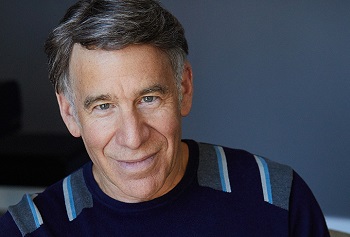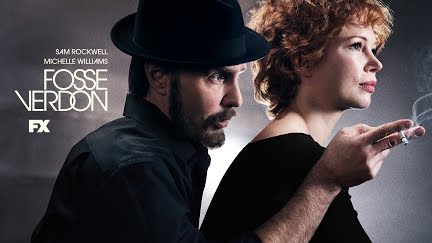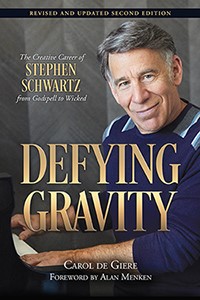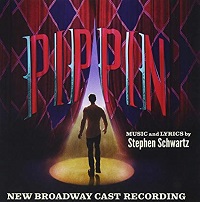An interview by author Carol de Giere and update from Stephen Schwartz


NOTE ADDED MAY 14, 2019: The following in-person interview explores Stephen Schwartz’s thoughts about Fosse/Verdon, Bob Fosse, and Pippin. At the end, readers will also find an update from Stephen sent by email after he viewed Episode 4.
For Stephen Schwartz, listening to Sam Rockwell’s voice as he plays Bob Fosse in FX’s Fosse/Verdon TV miniseries is a form of déjà vu. “I’ve only seen the first two episodes so far,” he said as of April 22nd when we spoke over lunch. “One thing that amazed me immediately is that Sam Rockwell sounds exactly like Bob. I had to keep reminding myself that it wasn’t actually Bob. He doesn’t look like Bob all the time, but at the period of his life when I knew Bob, he looks a lot like him, and he sounds exactly like him. It’s really an uncanny impression, so that makes it fun.”
As Pippin fans know, Bob Fosse served as director-choreographer, working with Stephen Schwartz (composer-lyricist) and Roger O. Hirson (book) as the show was moving toward the Broadway opening in October 1972. The Fosse/Verdon series will feature Pippin in episode 4, airing on April 30th. Schwartz says he is “excited and a little nervous to watch it.”
The focus of the bioseries is the near thirty-year creative, romantic, and often challenging relationship between Fosse and Gwen Verdon. As theater writer David Cote describes the angle of the show in the Observer, “He was a pill-popping, insecure workaholic whose fathomless libido no amount of chorus girls could fill. She was a triple threat who won four Tonys in six years, put her career on hold to be a mother, but stayed hungry for the spotlight.”
Schwartz continues to have a complex opinion of his former colleague, Bob Fosse, who died in 1987. When they worked together, there were many moments of friction, but also admiration, and Schwartz attests that his appreciation of Fosse has grown over the years.

I cover the story of Pippin and the Pippin revival in the 2nd edition of Defying Gravity biography.
caroldegiere.com/defying-gravity/
I know many people who are watching the miniseries. Several questions had come up that I was able to raise with Stephen. At the beginning of our conversation, he expressed his pleasure attending the NYC screening of the first episode and watching the second on television, and then over curry dishes at an Indian restaurant, we continued to explore his response to Fosse/Verdon. (The following transcript has been slightly edited for clarity.)
Carol de Giere: It’s really not showing Bob off. It’s not a positive spin.
Stephen Schwartz: I read some things about the show in an interview with the writer before it premiered, and he said that they were trying to do an honest portrayal of Bob. And you know, he wasn’t a very nice guy.
But he was a very talented guy. The other day I was looking around YouTube and I saw that they had posted a nine-minute video of Bob dancing, some of it with Gwen, and some of it from his early days in movies. He was fantastic. He was like Gene Kelly. I know he always wanted to be Fred Astaire but he was more like Gene Kelly in his athleticism and energy. Seeing those videos gave me a different feeling about him, I have to say. In some ways I wish I had done Pippin in the days when YouTube existed. I think I would have gone into rehearsal with a different kind of regard for Bob, if I had seen those videos of when he was younger.
Of course I already respected him as a director and choreographer. Unlike many other people, I was a fan of the Sweet Charity movie. And I had seen and admired his work on Broadway…
But watching Fosse/Verdon and seeing his response, which I think is probably accurately depicted, to the failure of the Sweet Charity movie and how desperate he was at the point when he first undertook Pippin, I wish I had known that. Because don’t forget, Cabaret had not opened yet and he was still doing all the struggling with that movie that the series shows. But then, the truth is that at twenty-four years old, I was struggling with my own demons, so who knows if it would have changed my relationship to him?
CD: It’s very clear how insecure he was.
SS: Exactly, I had no idea of that. I was a twenty-four-year-old kid; he didn’t present that to me. He just presented his impatience and his inarticulateness.
CD: They are showing him as being manipulative.
SS: I didn’t experience that. I don’t think he was manipulative with writers.
CD: More with the women of his life?
SS: Maybe more with the women and with performers because he was more comfortable with them.
CD: “Bully” is maybe a better term than “manipulator.”
SS: He was definitely a bully.
CD: Because he wanted his way.
SS: Well, everybody wants his way, but he was truly one of those ‘my way or the highway’ guys.
CD: The cast list doesn’t yet say who is playing you.
SS: I know who is playing me. He’s a recent Carnegie Mellon grad – Jimmy Brewer. He’s very talented. I met him when he was at CMU. He’s exactly who you want to have play you in a movie — He looks a little like me, but he’s taller and much handsomer. So I’m just delighted that’s how I’m going to be portrayed.
CD: This is something that [our mutual friend] Stuart Friedman found and it’s kind of his question. Why didn’t Gwen play Fastrada in Pippin?
[Stephen read this quote that I brought: “Despite appearances, Fosse still supposedly retained a resentment of his wife, and perversely used it in his next stage show, Pippin. It opened in Washington on September 20, 1972; the character of Fastrada was the title character’s evil stepmother, and modeled on Verdon. She was played by Verdon lookalike Leland Palmer, who would later play the Verdon character in the film All That Jazz, and here she wore a red wig. Cast members felt that Fosse did this to give his wife a kick in the pants and there were rumors that Verdon would go to Washington to see the show.” from Gwen Verdon: A Life on Stage and Screen by Peter Shelley]
SS: Well, she wouldn’t have done a role that small. Gwen Verdon was a gigantic star—an above the title star.
CD: So, this writer is wrong.
SS: I don’t think it’s true at all. My perception was that Bob’s making Fastrada look and dance like Gwen was because Bob wished that he did have Gwen in the show. I think it was a tribute to her.
And Gwen did come to Washington. I met her very briefly there, just once. In fact, Bob had his whole “brain trust” come to Washington during our out-of-town tryout. There was Paddy Chayefsky, whom they show in the first episode of Fosse/Verdon, played by our original Fiyero, Norbert Leo Butz, And another playwright named Herb Gardner, who wrote A Thousand Clowns. The two of them came to Washington and Gwen came. And I’m sure they gave Bob a lot of notes and ideas, but I was never privy to what they had to say. I’d just see them eating, and mostly drinking, in the restaurant at the Watergate Hotel.
What I think is interesting is that he was very friendly with these two famous and accomplished playwrights and never directed anything they wrote. I suspect, if they had ever had him as a director, they might not have been so friendly.
CD: Lin-Manuel Miranda said in one interview that it demolishes the auteur theory that you can be an artistic genius on your own. He’s saying you always have to have the right team marching in the same direction to create something.
SS: I think that’s accurate. They are showing how dependent Bob was on Gwen. But “auteur” or not, I think it has to be acknowledged that Bob, more than any choreographer of his time and since, had an unbelievably specific and instantly recognizable style. Think how hard that is to achieve — a choreographer whose work you can see and immediately know that’s whom it’s by. Try to think of another Broadway choreographer of whom that’s true.
It’s extraordinary to have created a choreographic voice still influential 50 years later. I just saw the revival of Kiss Me, Kate and in the middle of “Too Darn Hot,” all of a sudden there’s this move where the dancers all slouch and snap their fingers, and immediately you think Bob Fosse. That’s an extraordinary achievement. Maybe some of his style was developed with and because of Gwen, but in the end, it was his.
Listen, I didn’t like Bob as a person. He was difficult to collaborate with. He was a nasty guy. He was a bully. But my admiration for him was strong then and has only grown stronger over the years.
CD: A different thing about Pippin, people were asking about Jill Clayburgh and …Betty Buckley… wondering why Betty didn’t get the role in the first place….
SS: I don’t remember if she came in when we were initially casting. I know I brought her up because I knew her from 1776. And Stuart [Ostrow, the producer] knew her very well because Stuart produced both shows, so of course she was on everybody’s mind.
CD: But they wanted a movie star.
SS: Well, someone who was going to be a movie star. I remember when Jill Clayburgh came in, and I thought she was lovely, and of course, she read very well, but I said, ‘I don’t think she sings well enough for the role.’ And Bob said, ‘She’s going to be a movie star, take my word for it, and I think we need that in this role.’

CD: Do you know anything about how much of Pippin is going to be in Fosse/Verdon?
(Link to Pippin revival cast album)
SS: Well, they licensed a lot of the songs. How many they are going to end up using, and how much is going to wind up on the cutting room floor, I don’t know.
CD: It will all be based on Sam Wasson’s book Fosse.
SS: Yeah, but I saw the script because I had to approve the scenes in which I’m portrayed.
CD: Oh, you did. I wouldn’t have known that.
SS: I actually made a couple of suggestions to them, which they took—suggestions about accuracy. For instance, they had a disagreement between Bob and Roger [Hirson, the bookwriter] and me that Bob wanted to make the “Glory” sequence more anti-war, more gruesome. But actually that wasn’t true. Because don’t forget it was the time of the Vietnam War, and I was very opposed to the Vietnam War, and that was part of what we were writing about. What Bob wanted to do was emphasize the sexiness of the war sequence and how people kind of get off on war. That was something Roger and I didn’t get at first, so that was what the disagreement was about. And at least in the final version of the script that I saw, the writers of Fosse/Verdon changed that.
Anyway, I’m excited about the show. It’s been very interesting to watch so far, and I think they’ve done a really good job with it. You can be sure I’ll be watching April 30th!
EPISODE 4 UPDATE
I asked Stephen Schwartz if he could send me comments after watching the FOSSE/VERDON episode about Pippin. See his email message below:

SCHWARTZ: I really liked the Pippin episode of Fosse/Verdon. I thought it was the strongest so far, but maybe that’s just me being solipsistic. In any event, I liked how the writers used material from Pippin to reflect Bob’s own psychological struggles, and I especially admired the use of “I Guess I’ll Miss the Man” for Nicole, which I found quite moving (and well performed by the young actress playing Nicole). It was uncanny how apt the lyrics were (except for the last line). I thought it showed the continuing relevance and resonance of Pippin in terms of its underlying emotional content, and it made me newly proud of the show.
In terms of how I was portrayed, as I’ve said before, it was nice to be played by someone who sort of resembles me, only taller and better-looking. I thought Jimmy did a great job, and they got my 1972 hairstyle and clothing-style right (embarrassing as the latter now seems). The actual incidents they showed were not really accurate in terms of the specific content or what was said, but they captured the truth of the experience of working with Bob on the show.
It interested me that they emphasized Bob’s dissatisfaction with the ending, since as most people know, we eventually found what I think is the right ending for the show several years after Bob passed away. As I’ve said before, it’s one I think he would have been happy with if any of us had thought of it then. I’m glad we’ve been able to solve that issue that bugged us all and that now all productions do the new ending; it’s just too bad that for Bob, it proved to be posthumous.
MORE SCHWARTZ NEWS: Please see the Spring 2019 issue of The Schwartz Scene newsletter for additional news from Stephen Schwartz’s world.
PHOTO BELOW: Carol de Giere and Stephen Schwartz at the lunch interview.

